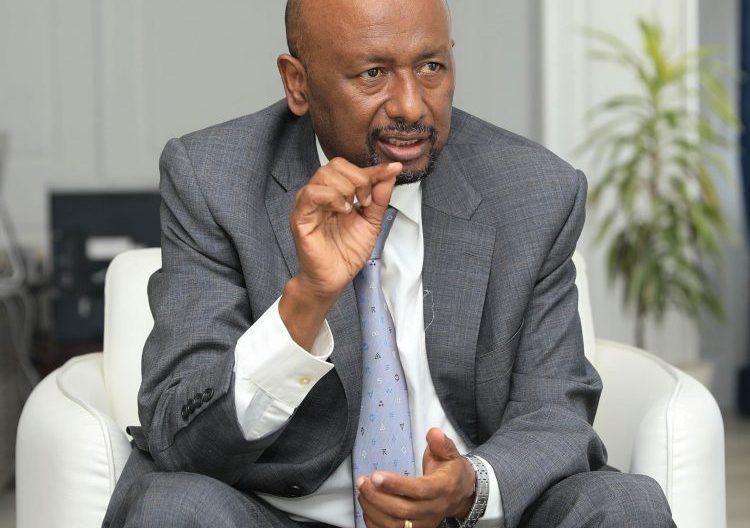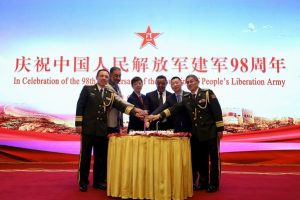
Thank you, Mr. President,
Mr. President, please accept my best wishes as you steer the work of the Security Council for the month of July.
In this meeting and deliberation of the Council, where a hydroelectric dam is under scrutiny in an unprecedented manner, I am not sure if I am not the first water minister, addressing this Council.
Ethiopia believes, it is unfitting use of the time and resources of the UN Security Council to discuss the Grand Ethiopian Renaissance Dam.
Having said that, Mr. President, it is an honor for me to speak before this august body, voicing the concerns and just causes of my country – Ethiopia.
A year ago, on 29th June 2020, under your presidency, Council members encouraged Ethiopia, Egypt, and Sudan to continue negotiations to resolve the outstanding issues and expressed support for the African Union-led process to facilitate further talks.
Ethiopia took part in the negotiation with renewed commitment and good faith to reach a mutually acceptable, negotiated outcome under the auspices of the AU.
I would like to pause, to give the Republic of South Africa a special recognition and our thanks for effectively facilitating the negotiation until the end of its AU chairmanship in February 2021.
Similarly, Ethiopia commends and stands with the Democratic Republic of Congo, the current Chairperson of the African Union, for its relentless effort under trying circumstances, including the repeated disruptions of the negotiations.
Mr. President,
We are dealing with a hydroelectric dam project, which is not the first of its kind in Africa or in the world. We are building a reservoir to store water that will generate electricity by hitting turbines. For your information, the GERD reservoir is two and half times smaller than that of the Aswan Dam in Egypt.
Perhaps, what puts the GERD in distinction from other projects is the extent of hope and aspiration it generated for 65 million Ethiopians that have no access to electricity.
It is also unique because the construction of this five-billiondollar Dam is financed by the blood, tears, and sweat of ordinary Ethiopians. The GERD is a right dam built at the right place for the betterment of people in the broader region.
Our unfortunate inability to utilize the Nile River so far is deeply embedded in the psychology of our people. Two famous Ethiopian proverbs underscore this point: “Gowwaan bishaan keessa dhaabate dheebota” or የአባይን ልጅ ውሃ ጠማው ፡፡
Both roughly translate to – the irony of the tribulations of a poor man who stood in the middle of a river and lamented about experiencing extreme thirst [ተርስት].
To change this generational lament, we have nowhere to look but the Abay or Nile basin in which two-thirds of Ethiopia’s water resource is found. In this mighty river, which we share with our neighbors, our people saw hope to extricate themselves of darkness and marched towards it by building the GERD.
The Dam has the fingerprints of Ethiopia’s farmers, pastoralists, daily laborers, students, business-women and men, and the diaspora throughout the world that eke out a living in extremely difficult circumstances.
In equal, if not, exceeding terms, Ethiopians have best wishes and neighborly care for their compatriots in Egypt and Sudan. We have all the intention to live together in peace and cooperate for our mutual benefit. The GERD demonstrates this core principle of collective wellbeing and prosperity.
That is why the GERD is one of the regional integration projects under PIDA – the Programme for Infrastructure Development in Africa.
Mr. President,
Africa, the cradle of mankind, is currently the youngest continent in the world. Africa is set to reap its demographic dividend by investing in its youth. Similarly, my country, Ethiopia, has 70 percent of its population under the age of 30.
More than 100,000 (hundred thousand) Ethiopians graduate from higher education every year. Not only that, above 30,000,000 (thirty million) Ethiopians are in schools at various levels of education.
Catering to the needs of this growing population is an imperative and existential matter for my country.
The lives of Ethiopians that languish on the Sahara Desert attempting to cross into Europe; the migrants in the Middle East that sacrifice their youth to bring a better day for their families; the young boys and girls in migrant prisons in Africa and beyond; the bare-footed migrants that you see returning to their homeland in mass deportations from the Middle East, deserve a dignified life.
The GERD is a people’s project, and our humble attempt to realize this dream. Against all odds, we chose to act, and act in spite of the arduous obstacles we faced. Instead of coalescing in these challenges, we struggled to prevail. Little by little, we are overcoming.
Mr. President,
Unfortunately, we are here because Egypt and, most recently Sudan, have expressed their opposition to this hydroelectric Dam. It is important to note that our two neighbors
have large and small dams and canals they have constructed, with absolute disregard to the right of other riparian countries and rejecting Ethiopia’s repeated plea for consultation.
After a series of initiatives to address the concerns of our neighbors in good faith, we are compelled to conclude that their objection is not as such directed at the GERD but rather to stop any water use by Ethiopia.
The fact of the matter is; we have no viable alternative. Unlike Egypt and Sudan, Ethiopia has no considerable ground-water reserve. We also don’t have seawater to desalinate. Nearly 70 (seventy percent) of my country’s water is in the Nile Basin. Even if we want to, even if we try, we cannot avoid utilizing the Nile River.
In fact, constructing dams is only part of our focus. Our main objective is maximizing our scarce water resource by rehabilitating nature and preventing further depletion through our green legacy initiative.
With an overall goal of planting 20 billion trees in five years’ time, we planted 10 billion trees in two years. This initiative, which also consists of a seedling sharing outreach with our neighbors, is part of the Green Belt Initiative of the African Union. We call upon Egypt and Sudan to join this afforestation program that improves
resilience and increases water availability.
Mr. President,
Ethiopia believes that an agreement is within reach, given the necessary political will and the commitment to negotiate in good faith. We have already reached an understanding on a considerable number of the issues.
The AU is seized of the matter and is ably facilitating our negotiation. That is why it is regrettable that our sisterly countries opted to bring the matter to the Security Council.
I will not drag you to a discussion of issues on my usual disposition to explain technical details on dams and hydrology.
However, I want us to truly appreciate the subject matter we are compelled to discuss. We are speaking of a hydroelectric dam.
For the first time since its establishment, this Council is being asked to pronounce itself on a water development project. The Security Council is a political and security organ. It is unhelpful and misguided to present an issue that requires a hydro-technical solution to this global security body.
Mr. President,
It must also be clear that the underlying
problem for the differences between the three countries is the quest to preserve colonial and monopolistic status quo over the Nile.
This approach of trying to solve problems using the mindset that created them is what blocks our consensus on the GERD.
The Security Council is faced with the question to determine whether or not “Ethiopians have the right to utilize the Nile River.”
On behalf of all Ethiopians, I implore our friends in this Council and in the wider international community to answer this question: “Do Ethiopians have the right to drink from the Nile?”
Mr. President,
As a point of information, allow me to share with you the latest status of the AU-led negotiation.
On 24th June 2021, the AU Bureau of Assembly convened a meeting to discuss various issues, including the GERD.
The President of the Democratic Republic of Congo, H.E Felix Theisekedi, briefed the Bureau and introduced his plans for the upcoming negotiations. Unfortunately, the Republic of Sudan did not attend this high-level meeting. With the absence of Sudan in this Bureau meeting, the two countries have blocked nine meetings since June 2020.
We should learn by now; Ethiopia does not respond well to undue political pressure and interference. Ethiopia will continue to exercise maximum restraint and showcase cooperation because we are forever linked by this majestic river. Whether we like it or not, we will continue to drink from the same river and must learn to live together as neighbors.
I reiterate Ethiopia’s longstanding commitment to the AU-led process, underpinned by a belief that Africans have the wisdom, the technical expertise, and most importantly, the agency to address their challenges.
We believe, the phased-approach proposed by President Felix Thesiekedi, the Chairperson of the African Union, could help us work towards resolving the quagmire created by the colonial heritage on the Nile Basin that Egypt and Sudan are determined to preserve.
Mr. President,
Allow me to address the much talked about second-year filling of the GERD:
The second-year filling of the GERD happens in July and August of this year. We have proactively provided the necessary data on the modalities for the filling of the Dam.
Let me be clear: The filling of the GERD is part of the construction process. This is clearly stipulated in the Declaration of Principles our three heads of states signed in March 2015.
The filling of the Dam, Mr. President, is pure
physics. Once the dam concrete reaches a certain height, the water either flows through the bottom outlets or overflows the concrete. The Dam, as designed, will store water until it reaches the 13.5 billion cubic meters indicated in the filling schedule agreed to by Egypt and Sudan.
It is only fair that a country that generates 77 billion meter cube of water, impounds a small fraction of the annual inflow for its hydroelectric Dam.
Egypt and Sudan do not need any convincing as to the fortunes they will acquire upon the completion of the Dam. In the wise words of Sudanese officials, the GERD is an instrument of regional integration. The GERD for Sudan is what the High Aswan Dam is for Egypt.
Here I am going out of my way to explain to you the absence of any threat caused by the GERD.
However, we should not even have to litigate the benefits Egypt and Sudan will acquire from the GERD to argue for our legitimate share from the Nile. All of us – Nile Riparian countries – are there to share both the bounty and the scarcity. None of us are ought to stand thirsty watching the other drink.
Through the GERD, Ethiopia is summoning this common sense to prevail in the Nile Basin. Therefore, this Council should not be dragged into the GERD negotiations in the expedient pursuit of domestic political objectives.
Mr. President,
If the Council consents to the path proffered by Egypt and Sudan, it will certainly be entangled with resolving disputes on all transboundary rivers.
Interestingly, other than one island sisterly country of ours, all members of this Council
have transboundary watercourses. You have dealt with and continued to address differences bilaterally and through basin-wide efforts.
The GERD talks and the process we have undergone since 2011, gave us a major lesson. Hopefully, this process will nudge us to work towards our regional mechanism on the Nile Basin.
In this regard, it would be regrettable for the Council to circumvent this hope by unhelpful precedent whereby the Member States impose through the Council what they should acquire by goodfaith negotiation. The Council should resist concerted efforts to turn it into an appellate (አፒሌት) body on Transboundary Rivers or negotiations.
Mr. President,
Colonialism and colonial treaties thwarted Africa’s ability to utilize its natural resources for the benefit of its people.
The Nile Basin countries have recognized this problem and worked towards addressing it. In 1999, we established the Nile Basin 12 Initiative, and in 2010 we adopted the Cooperative Framework Agreement on the Nile after 13 years of negotiation.
In this Framework agreement, which many of you in this Council have financially and technically supported, the Nile Basin countries agreed to share the Nile water in an equitable and reasonable manner.
We replaced the colonial and monopolistic claims with accepted principles of international law. This instrument is now awaiting two more ratifications for entry into force.
The insatiable demands of Egypt and, most recently, Sudan are not about the moot issue of the GERD but about the future development projects in Ethiopia and the other riparian countries.
Without an effective CFA and regional mechanism, similar applications will inevitably come to this Council. Today, it is Ethiopia’s Dam; tomorrow, it will be any one of the Nile Basin countries.
The Nile belongs to all the people of the Basin countries – all the half billion of us in the eleven riparian countries. The water is enough for all of us.
In this regard, we urge our Egyptian and Sudanese brothers and sisters to understand that a resolution to the Nile issue will not come from the Security Council; it can only come from good faith negotiations with due care for the wellbeing and development of each other.
Ethiopia looks forward to continuing the AU-led trilateral negotiation on the GERD. We have the solutions at hand, and we can herald good news to the world by concluding a mutually acceptable outcome.
Finally, Mr. President, allow me to respectfully request the Council to:
● Return this matter to the table and legitimate leadership of the African Union;
● And encourage Egypt and Sudan to seriously and faithfully negotiate to reach a negotiated settlement on the first filling and annual operations of the GERD;
We also request the Council to make this meeting the last of its deliberation on the Grand Ethiopian Renaissance Dam. There is no subject matter as far from the mandate of the Council as this one.
I thank you!
Editor’s Note: The views entertained in this article do not necessarily reflect the stance of The Ethiopian Herald
The Ethiopian Herald July 11/2021




